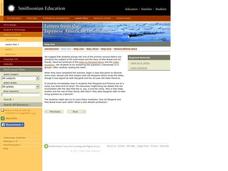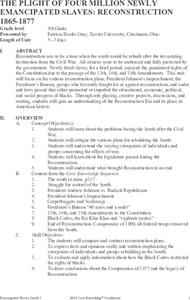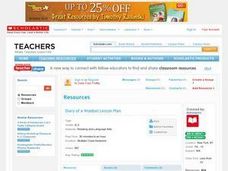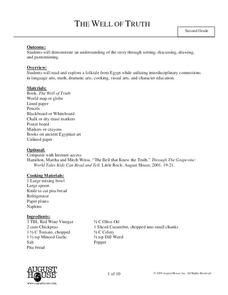Curated OER
For Public Display
Students compare three works of art to understand how juxtaposition can express a point of view. They brainstorm topics of interest to them and their respective communities that could act as a springboard for curating individual exhibits...
Curated OER
Letters from the Japanese American Internment
Students delve into primary research. In this Japanese Internment lesson plan, students make deductions about life in an internment camp by reading and comparing letters written to Clara Breed. Along the way, they consider the advantages...
Curated OER
Character Study
In this character study worksheet, students complete a graphic organizer with 6 boxes. Students complete the sentences in the boxes that are written in the first person from the point of view of the character. Example: Other people think...
Curated OER
The Great Debate: Internationalists vs. Isolationists
Students examine the opposing arguments of the isolationists and internationalists in 1941. In this debate lesson, the students are divided into two opposing groups representing a position in a live, in- class debate. After the debate,...
Curated OER
The Plight of Four Million Newly Emancipated Slaves: Reconstruction - 1865-1877
Students study the Reconstruction Era after the US Civil War. In this Reconstruction lesson set, students examine the problems that were encountered by the South after the Civil War, look at different plans for Reconstruction, and...
Curated OER
Diary of a Wombat
Learners create a diary entry from an animal's point of view. In this creative writing lesson, students read the book Diary of a Wombat and conduct brief research on an animal of their choice. Learners create a diary entry based upon...
Curated OER
The Well of Truth
Second graders explore the Egyptian folktale, The Well of Truth. In this folktale instructional activity, 2nd graders read the tale and discuss the events from the text. Students write a diary entry from the point of view of a character...
Curated OER
Electric Energy
Students research and create a diorama about energy of the 1740s. In this electric energy instructional activity, students use the Internet to research one of six energy topics. Students take the point of view of a person in the 1740s or...
Curated OER
What Do We Need In Our Environment To Survive?
Students discuss and write about waste management to save the environment. In this environment lesson, students discuss what an alien coming to Earth would notice about the environmental needs of humans for survival. They pretend that...
Curated OER
Indianapolis 500 Unit -- Writing
Fourth graders write a narrative from a race car driver's point of view. In this narratives instructional activity students use the narrative writing format to write about a race car driver's experiences in the Indianapolis 500. The...
Curated OER
First Nations Contributions
Sixth graders investigate point of view of a Native and a Missionary by reading articles by each. In this Native Person versus Missionary lesson, 6th graders look at the contributions of the Atlantic First Nations. ...
Curated OER
Esperanza Rising: Lesson 5 of 15 in Unit Plan
Sixth graders complete instructional activity 5 of 15 about the book Esperanza Rising. In this Esperanza Rising instructional activity, 6th graders build on work done in the previous instructional activity. They complete response logs,...
Curated OER
Patriot or Loyalist? A Revolutionary Decision
Students research as a reporter would and present the loyalist and patriot point of view on the American Revolution. In this patriots versus loyalist lesson, students produce a project such as a video debate or webpage explaining...
Curated OER
Marine Protected Areas
Students role play different stakeholders perspective on the debate about Channel Islands. In this marine science instructional activity, students identify different types of Marine Protected Areas. They research about their...
Curated OER
A View of Yourself Through Famous Writers
High schoolers research famous quotes and discover one that describes themselves. They consider topics such as family and hobbies that will help others understand them. They present their information to the class.
Curated OER
Global Warming--Points of view
Students are introduced to global warming through analysis of political/editorial cartoons dealing with the subject. They discuss the cartoon and what the feel it means and then discuss the mechanics of and the concerns about global...
Curated OER
Point of View and Scientific Truth
Students investigate the mystery of the "destructive force." They explore the concepts of natural phenomena. Students discuss the limited aspects of natural phenomena and the "whole truth" to generate new hypotheses that can be tested.
Curated OER
Point of View
Students participate in an inkblot test to discuss how what they see is different than their classmates. After viewing various artifacts, they write down what they believe the object is and then they are placed into a group to discuss...
Curated OER
Perspectives in Writing
Students consider various perspectives in writing and write a short story. They view a painting and discuss its theme and the idea of personification as perspective. Choosing three different viewpoints, they write a story about the...
Curated OER
Fact and Opinion
In this writing learning exercise, students identify and describe the difference between a fact and an opinion. They place the cut-up words from the house ad in the correct column to indicate if they are fact or opinion.
Scholastic
Study Jams! Newton's First Law: Inertia
Give your class some inertia with a far out video and multiple-choice questions about Newton's first law of motion. Several examples are given in an animated feature in a style that upper-elementary learners will enjoy.
Cornell University
Fibers, Dyes, and the Environment
Nanofibers can be made through electrospinning or force spinning in order to reduce the negative impact on the environment. Pupils study the role of fibers and dye on the environment through a series of five hands-on activities. Then,...
Briscoe Center for American History
Mary Maverick and Texas History - Part 2
To conclude their investigation of the life of Mary Maverick and to demonstrate their ability to analyze primary source documents, groups use the SOAPS questioning method to examine Maverick's account of events in early Texas history.
Briscoe Center for American History
Mary Maverick and Texas History - Part 1
What's the difference between a diary and a memoir? Young historians explore the ramifications of this question as they learn how to use primary source materials to gain an understanding of life on the Texas frontier.
Other popular searches
- Authors Point of View
- Teaching Point of View
- Author's Point of View
- Point of View Rubric
- Identifying Point of View
- Point of View Narrator
- First Person Point of View
- Animal Point of View
- Different Point of View
- Third Person Point of View
- Ants Point of View
- Message Point of View

























